Charles E W Bean, Diaries, AWM38 3DRL 606/243A/1 - 1916 - 1934 - Part 7
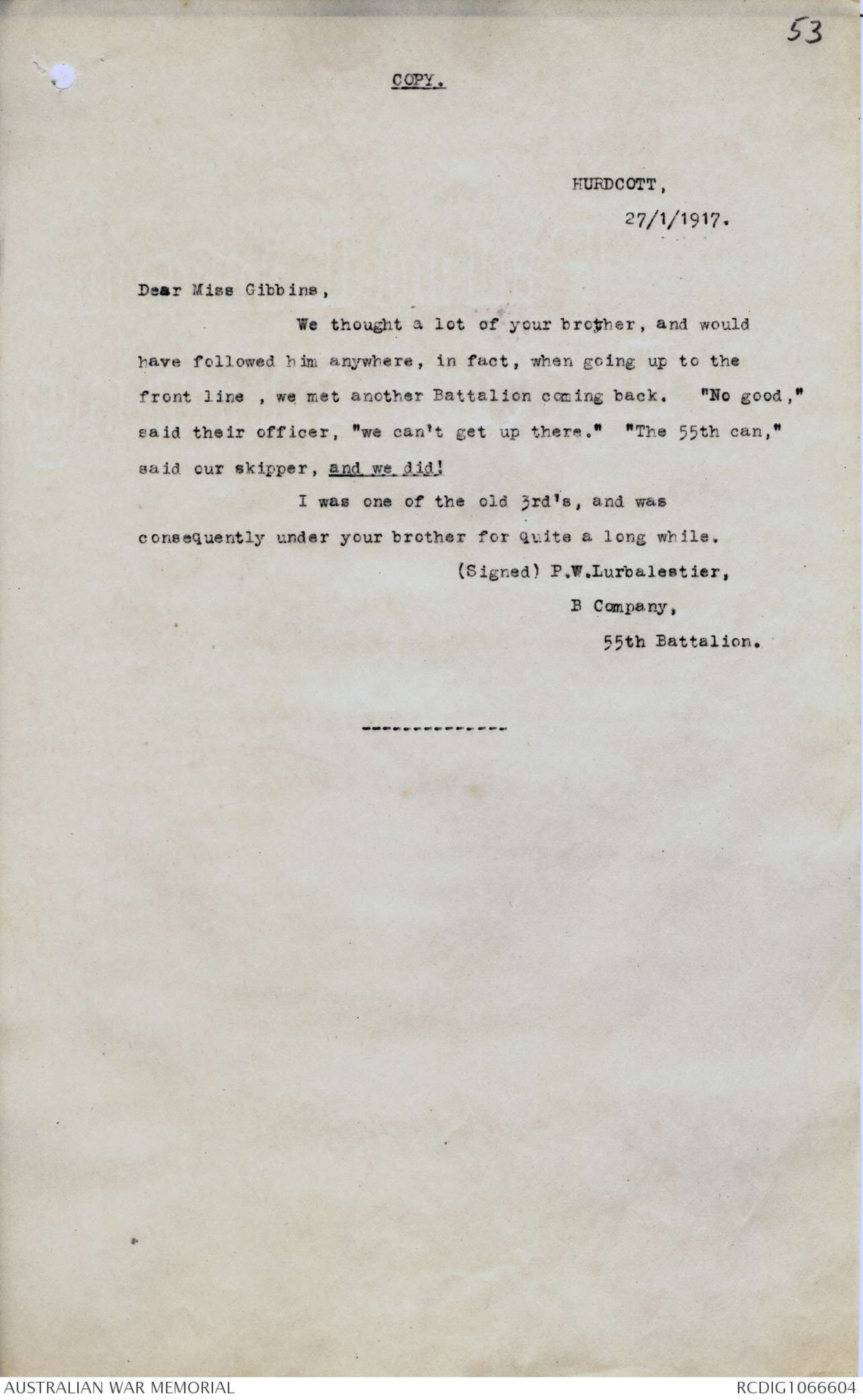
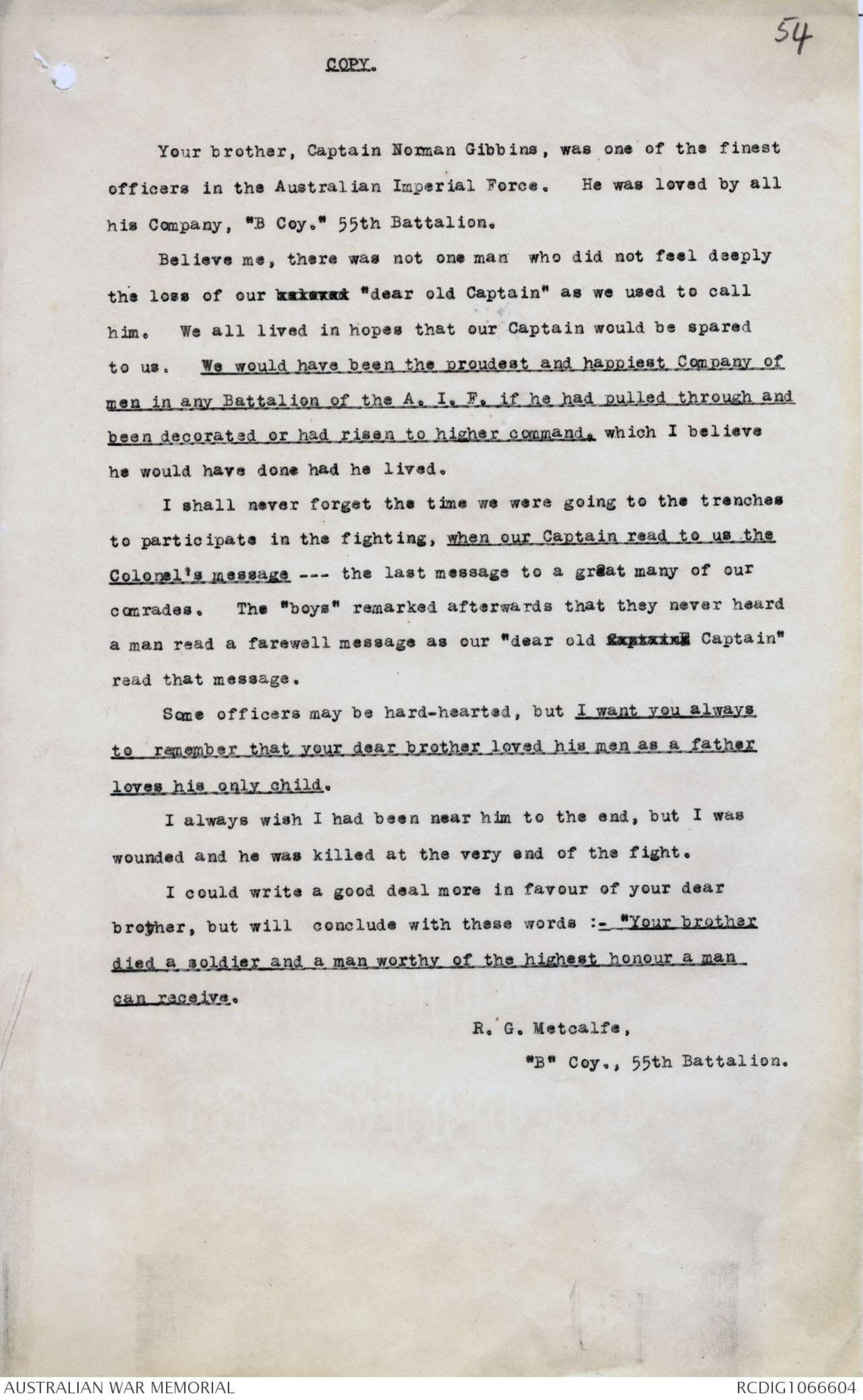
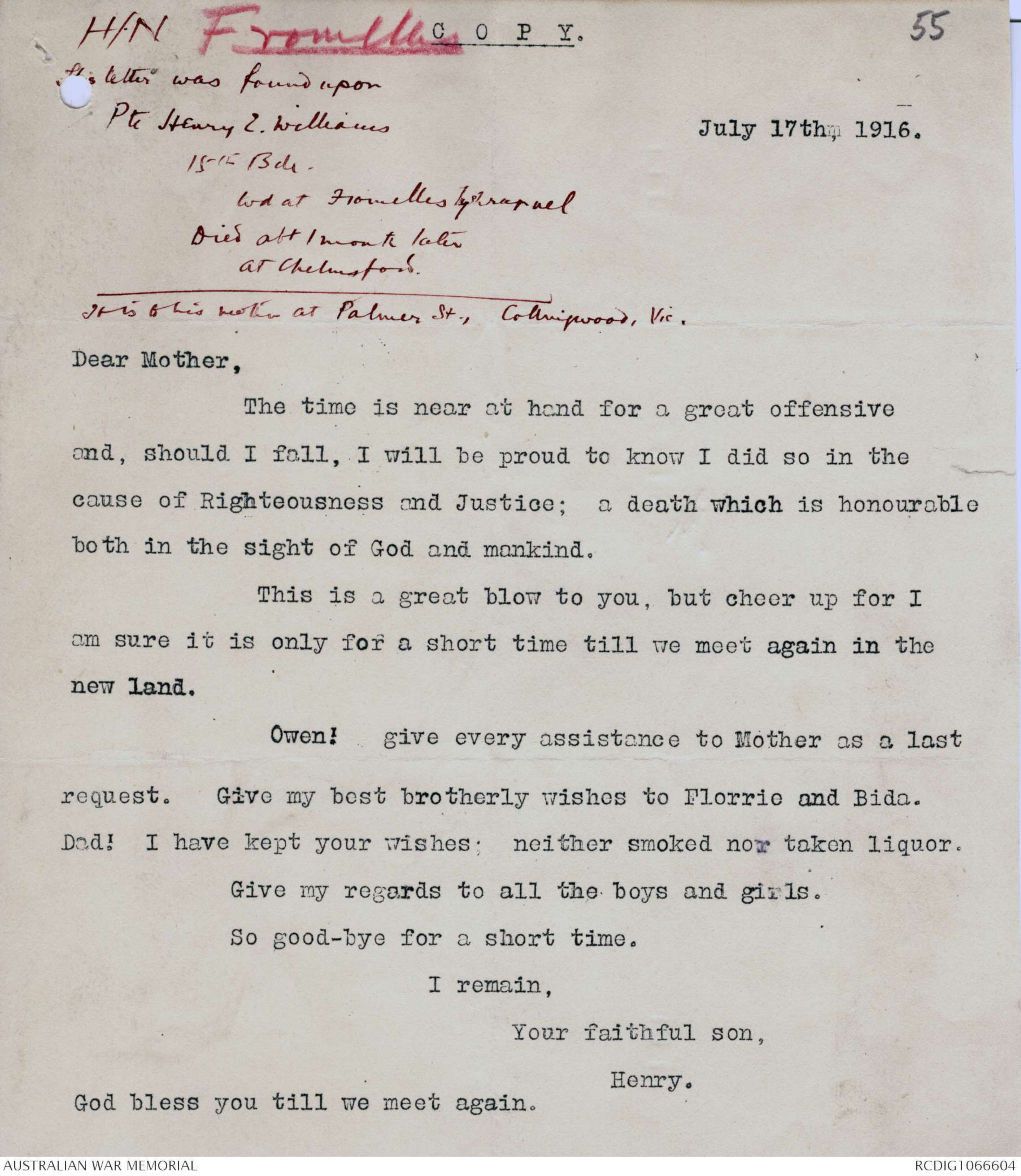
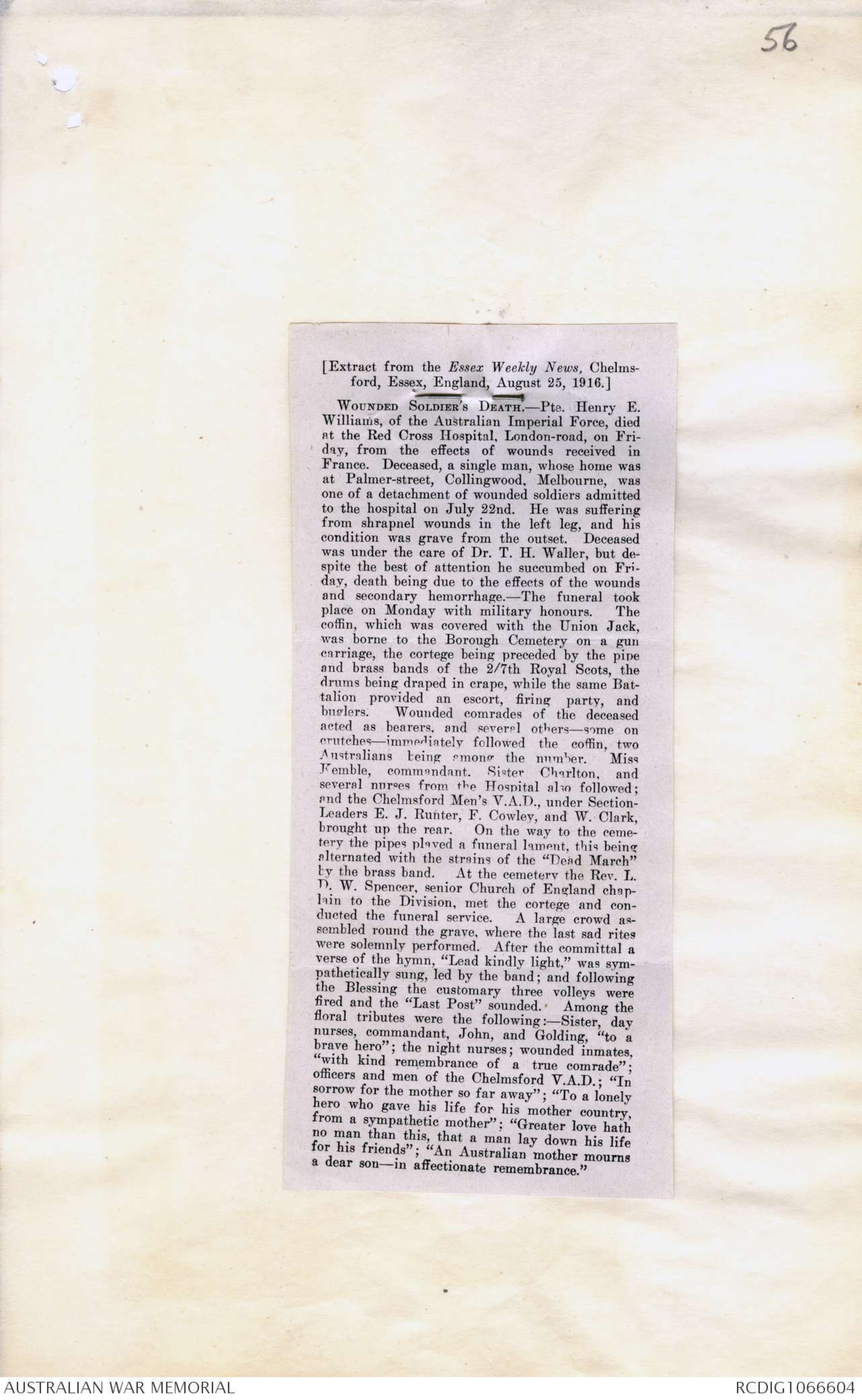
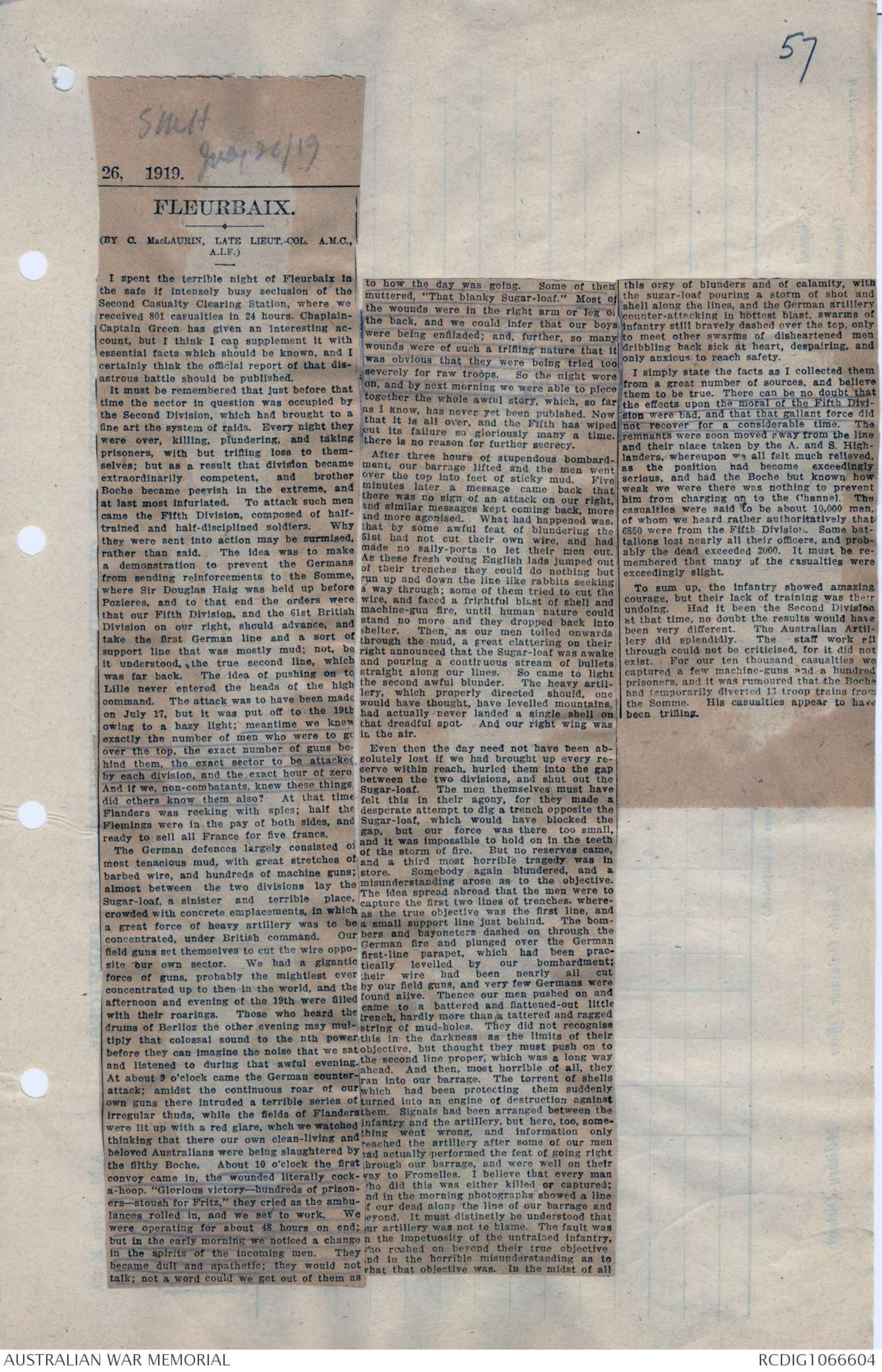
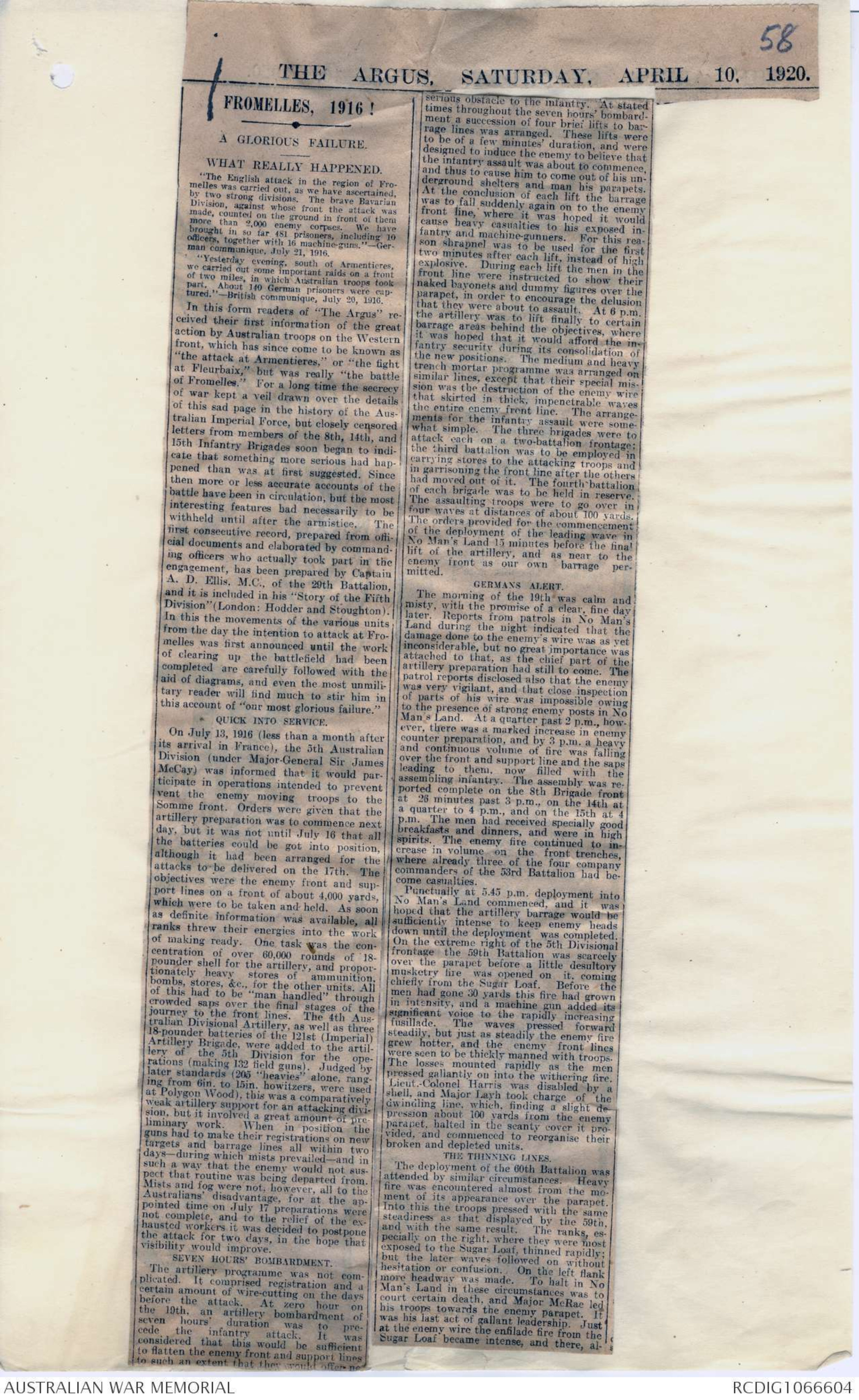
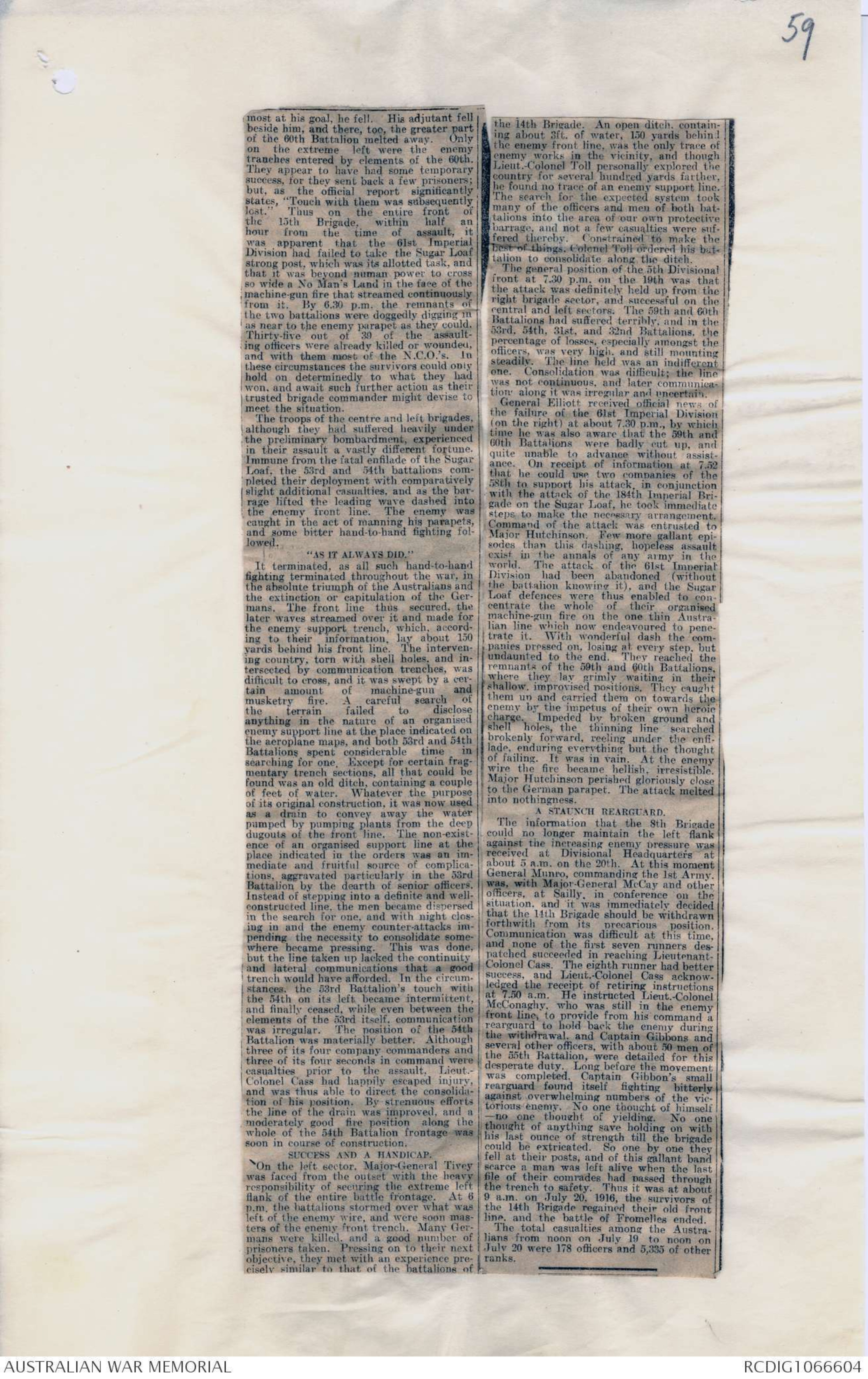
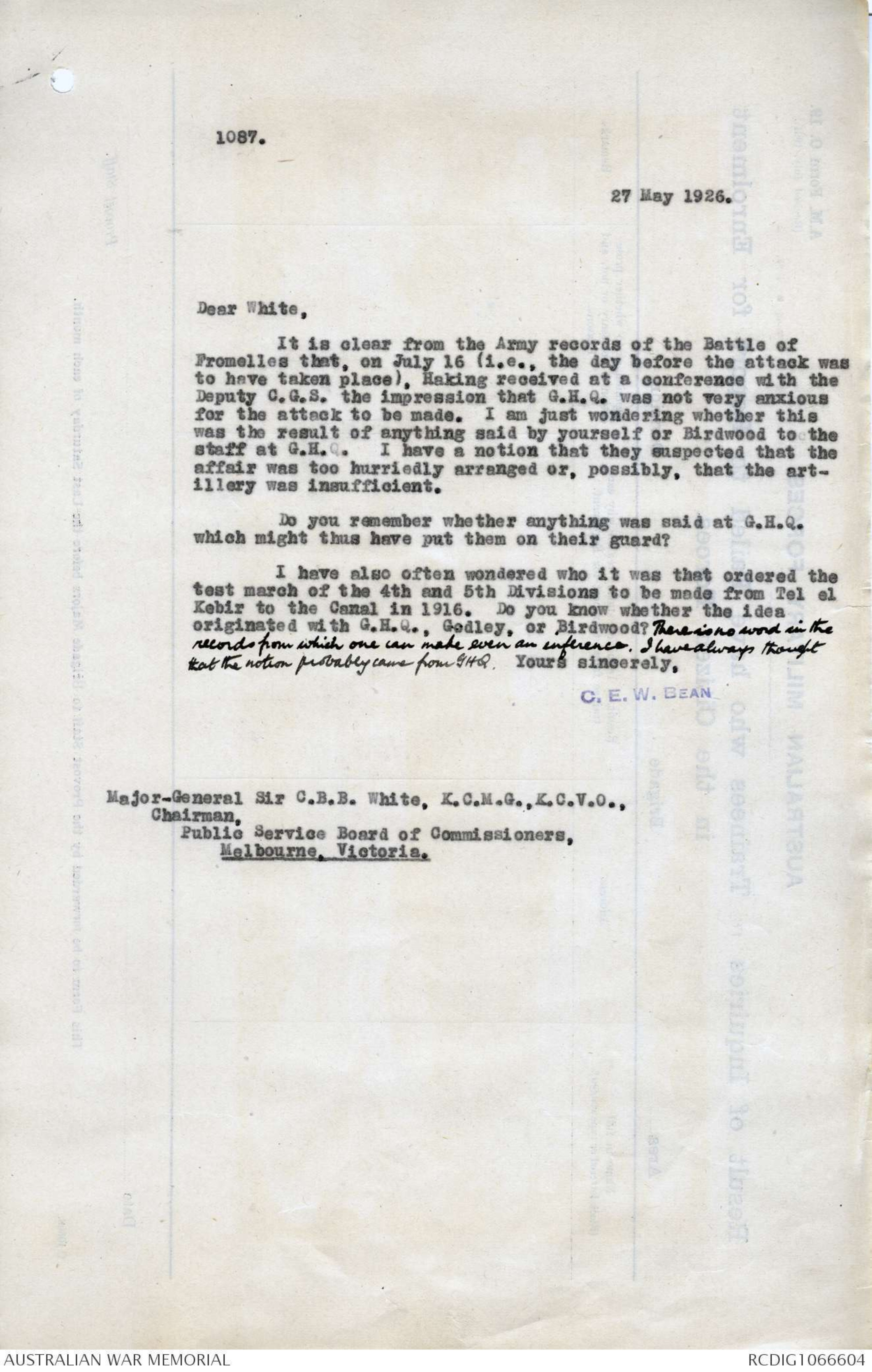
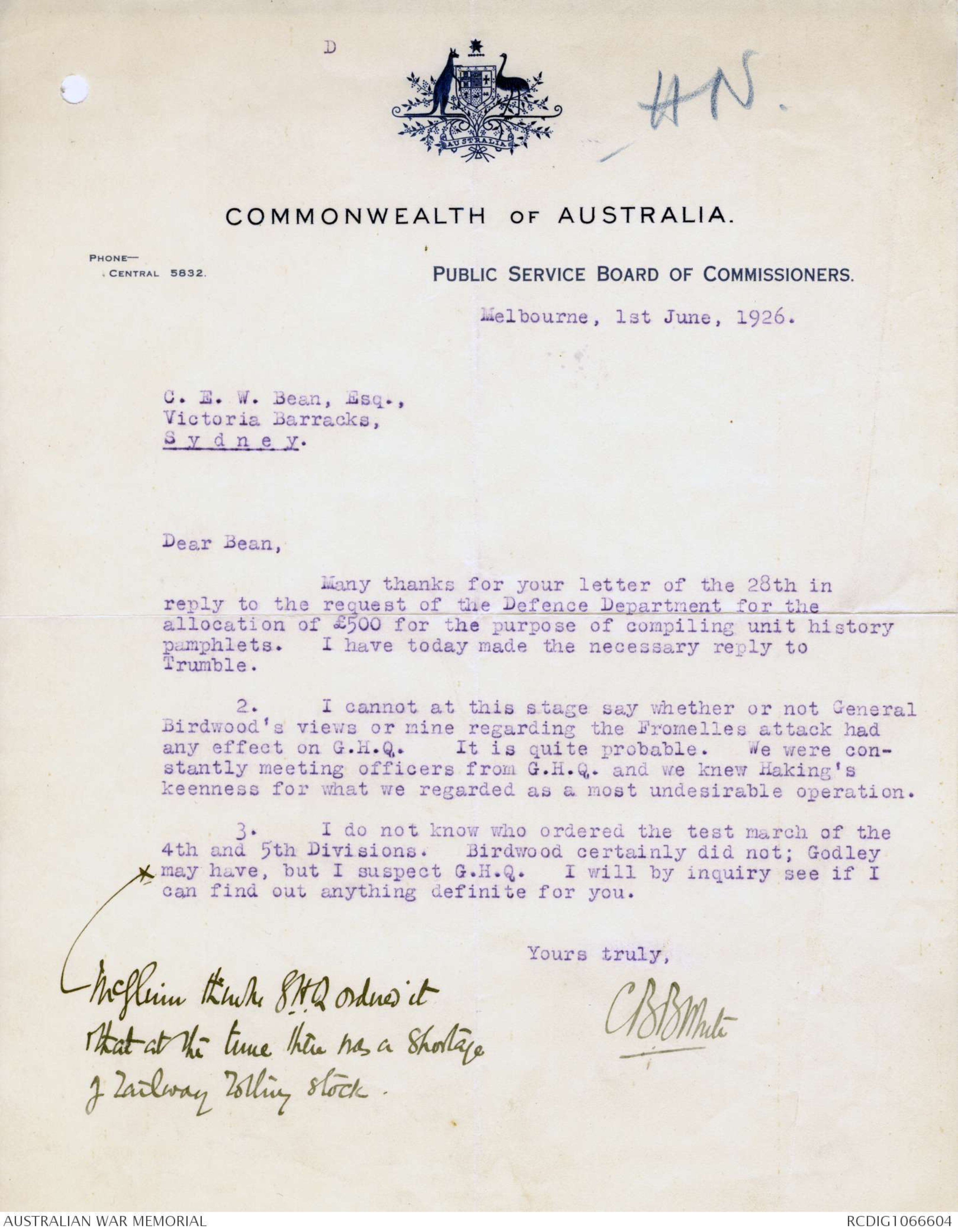
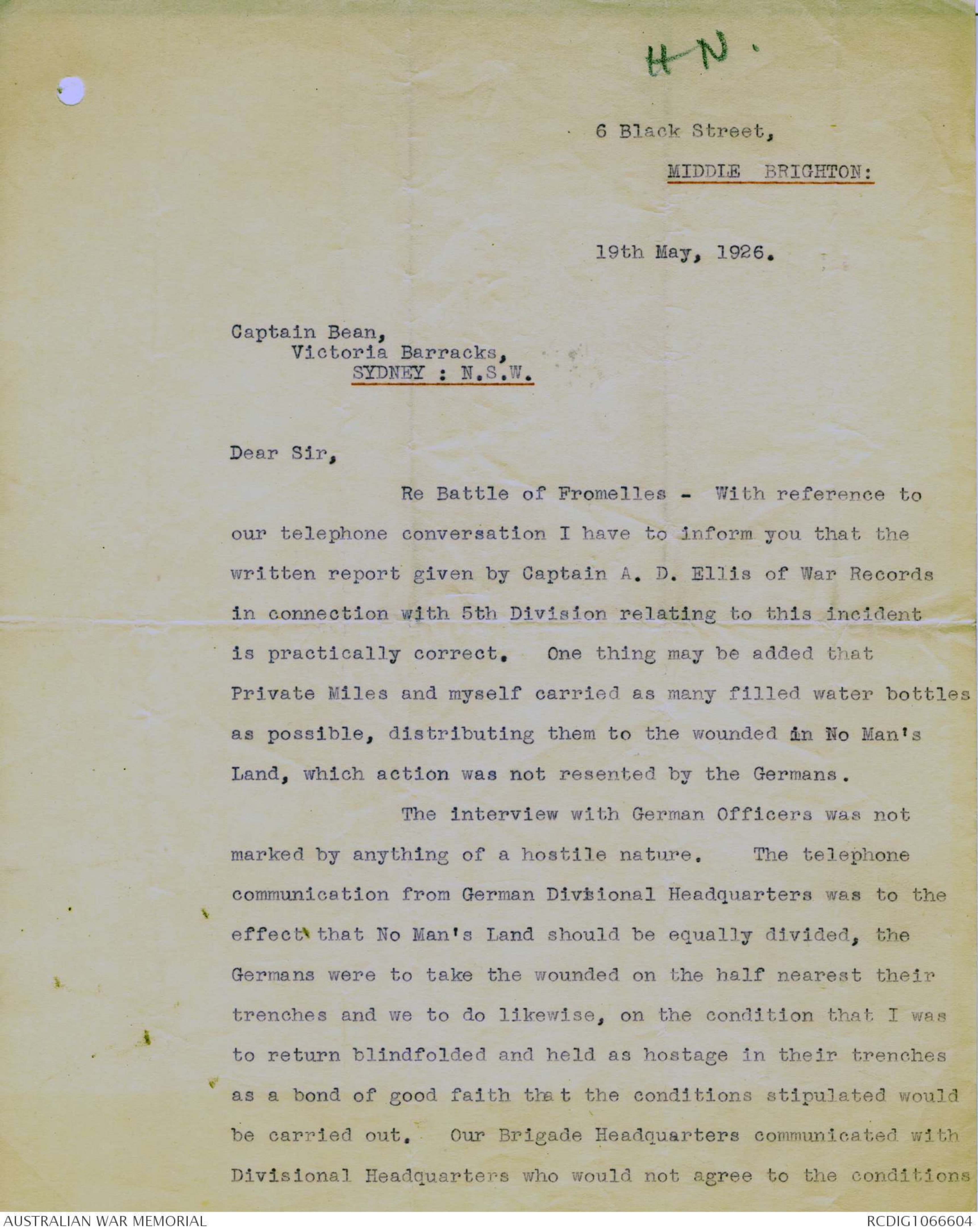
53
COPY.
HURDCOTT,
27/1/1917.
Dear Miss Gibbins,
We thought a lot of your brother, and would
have followed him anywhere, in fact, when going up to the
front line, we met another Battalion coming back. "No good,"
said their officer, "we can't get up there." "The 55th can,”
said our skipper, and we did!
I was one of the old 3rd's, and was
consequently under your brother for quite a long while.
(Signed) P.W.Lurbalestier,
B Company,
55th Battalion.
54
COPY.
Your brother, Captain Norman Gibbins, was one of the finest
officers in the Australian Imperial Force. He was loved by all
his Company, "B Coy." 55th Battalion.
Believe me, there was not one man who did not feel deeply
the loss of our beloved "dear old Captain" as we used to call
him. We all lived in hopes that our Captain would be spared
to us. We would have been the proudest and happiest Company of
men in any Battalion of the A. I. F. if he had pulled through and
been decorated or had risen to higher command, which I believe
he would have done had he lived.
I shall never forget the time we were going to the trenches
to participate in the fighting, when our Captain read to us the
Colonel's message –-- the last message to a great many of our
comrades. The "boys" remarked afterwards that they never heard
a man read a farewell message as our "dear old Captainx Captain"
read that message.
Some officers may be hard-hearted, but I want you always
to remember that your dear brother loved his men as a father
loves his only child.
I always wish I had been near him to the end, but I was
wounded and he was killed at the very end of the fight.
I could write a good deal more in favour of your dear
brother, but will conclude with these words :- "Your brother
died a soldier and a man worthy of the highest honour a man
can receive.
R. G. Metcalfe,
"B" Coy., 55th Battalion.
55
[*H/N Fromelles*]
COPY.
[*This letter was found upon
Pte Henry E. Williams
15th Bde
Wd at Fromelles by shrapnel
Died abt 1 month later
at Chelmsford
It is to his mother at Palmer St., Collingwood, Vic.*]
July 17th, 1916
Dear Mother,
The time is near at hand for a great offensive
and, should I fall, I will be proud to know I did so in the
cause of Righteousness and Justice; a death which is honourable
both in the sight of God and mankind.
This is a great blow to you, but cheer up for I
am sure it is only for a short time till we meet again in the
new land.
Owen! give every assistance to Mother as a last
request. Give my best brotherly wishes to Florrie and Bida.
Dad! I have kept your wishes; neither smoked nor taken liquor.
Give my regards to all the boys and girls.
So good-bye for a short time.
I remain,
Your faithful son,
Henry.
God bless you till we meet again.
56
[Extract from the Essex Weekly News, Chelmsford,
Essex, England, August 25, 1916.]
WOUNDED SOLDIERS DEATH.--Pte. Henry E.
Williams, of the Australian Imperial Force, died
at the Red Cross Hospital. London-road, on Friday,
from the effects of wounds received in
France. Deceased, a single man, whose home was
at Palmer-street, Collingwood. Melbourne, was
one of a detachment of wounded soldiers admitted
to the hospital on July 22nd. He was suffering
from shrapnel wounds in the left leg, and his
condition was grave from the outset. Deceased
was under the care of Dr. T. H. Waller, but despite
the best of attention he succumbed on Friday,
death being due to the effects of the wounds
and secondary hemorrhage. -The funeral took
place on Monday with military honours. The
coffin, which was covered with the Union Jack,
was borne to the Borough Cemetery on a gun
carriage, the cortege being preceded by the pipe
and brass bands of the 2/7th Royal Scots, the
drums being draped in crape, while the same Battalion
provided an escort, firing party, and
buglers. Wounded comrades of the deceased
acted as bearers, and several others —some on
crutches — immediately followed the coffin, two
Australians being among the number. Miss
Kemble, commandant. Sister Charlton, and
several nurses from the Hospital also followed;
and the Chelmsford Men's V. A.D., under Section-Leaders
E. J. Runter, F. Cowley, and W. Clark,
brought up the rear. On the way to the cemetery
the pipes played a funeral lament, this being
alternated with the strains of the "Dead March"
by the brass band. At the cemetery the Rev. L.
D. W. Spencer, senior Church of England chaplain
to the Division, met the cortege and conducted
the funeral service. A large crowd assembled
round the grave, where the last sad rites
were solemnly performed. After the committal a
verse of the hymn, "Lead kindly light," was sympathetically
sung, led by the band; and following
the Blessing the customary three volleys were
fired and the "Last Post" sounded. Among the
floral tributes were the following:— Sister, day
nurses, commandant, John, and Golding, "to a
brave hero"; the night nurses; wounded inmates,
"with kind remembrance of a true comrade";
officers and men of the Chelmsford V.A.D.; "In
sorrow for the mother so far away"; "To a lonely
hero who gave his life for his mother country,
from a sympathetic mother"; "Greater love hath
no man than this, that a man lay down his life
for his friends"; "An Australian mother mourns
a dear son - in affectionate remembrance."
57
[*SMH
July 26/19*]
26, 1919. July 26/19
FLEURBAIX.
(BY C. MacLAURIN, LATE LIEUT.-COL A.M.C.,
A.I.F)
I spent the terrible night of Fleurbaix in
the safe if intensely busy seclusion of the
Second Casualty Clearing Station, where we
received 801 casualties in 24 hours. Chaplain-Captain
Green has given an interesting account,
but I think I can supplement it with
essential facts which should be known, and I
certainly think the official report of that disastrous
battle should be published.
It must be remembered that just before that
time the sector in question was occupied by
the Second Division, which had brought to a
fine art the system of raids. Every night they
were over, killing, plundering, and taking
prisoners, with but trifling loss to themselves;
but as a result that division became
extraordinarily competent, and brother
Boche became peevish in the extreme, and
at last most infuriated. To attack such men
came the Fifth Division, composed of half-trained
and half-disciplined soldiers. Why
they were sent into action may be surmised,
rather than said. The idea was to make
a demonstration to prevent the Germans
from sending reinforcements to the Somme,
where Sir Douglas Haig was held up before
Pozieres, and to that end the orders were
that our Fifth Division, and the 61st British
Division on our right, should advance, and
take the first German line and a sort of
support line that was mostly mud; not, be
it understood, the true second line, which
was far back. The idea of pushing on to
Lille never entered the heads of the high
command. The attack was to have been made
on July 17, but it was put off to the 19th
owing to a hazy light; meantime we knew
exactly the number of men who were to go
over the top, the exact number of guns behind
them, the exact sector to be attacked
by each division, and the exact hour of zero.
And if we, non-combatants, knew these things
did others know them also? At that time
Flanders was reeking with spies; half the
Flemings were in the pay of both sides, and
ready to sell all France for five francs.
The German defences largely consisted of
most tenacious mud, with great stretches of
barbed wire, and hundreds of machine guns;
almost between the two divisions lay the
Sugar-loaf, a sinister and terrible place,
crowded with concrete emplacements in which
a great force of heavy artillery was to be
concentrated, under British command. Our
field guns set themselves to cut the wire opposite
our own sector. We had a gigantic
force of guns, probably the mightiest ever
concentrated up to then in the world, and the
afternoon and evening of the 19th were filled
with their roarings. Those who heard the
drums of Berlioz the other evening may multiply
that colossal sound to the nth power
before they can imagine the noise that we sat
and listened to during that awful evening.
At about 9 o'clock came the German counter-attack;
amidst the continuous roar of our
own guns there intruded a terrible series of
irregular thuds, while the fields of Flanders
were lit up with a red glare, which we watched
thinking that there our own clean-living and
beloved Australians were being slaughtered by
the filthy Boche. About 10 o'clock the first
convoy came in, the wounded literally cock-a-hoop.
"Glorious victory—hundreds of prisoners—
stoush for Fritz," they cried as the ambulances
rolled in, and we set to work. We
were operating for about 48 hours on end;
but in the early morning we noticed a change
in the spirits of the incoming men. They
became dull and apathetic; they would not
talk; not a word could we get out of them as
to how the day was going. Some of them
muttered, "That blanky Sugar-loaf." Most of
the wounds were in the right arm or leg or
the back, and we could infer that our boys
were being enfiladed; and, further, so many
wounds were of such a trifling nature that it
was obvious that they were being tried too
severely for raw troops. So the night wore
on, and by next morning we were able to piece
together the whole awful story, which, so far
as I know, has never yet been published. Now
that it is all over, and the Fifth has wiped
out its failure so gloriously many a time
there is no reason for further secrecy.
After three hours of stupendous bombardment
our barrage lifted and the men went
over the top into feet of sticky mud. Five
minutes later a message came back that
there was no sign of an attack on our right,
and similar messages kept coming back, more
and more agonised. What had happened was,
that by some awful feat of blundering the
51st had not cut their own wire, and had
made no sally-ports to let their men out.
As these fresh young English lads jumped out
of their trenches they could do nothing but
run up and down the line like rabbits seeking
a way through; some of them tried to cut the
wire, and faced a frightful blast of shell and
machine gun fire, until human nature could
stand no more and they dropped back into
shelter. Then, as our men toiled onwards
through the mud, a great clattering on their
right announced that the Sugar-loaf was awake
and pouring a continuous stream of bullets
straight along our lines. So came to light
the second awful blunder. The heavy artillery,
which properly directed should, one
would have thought, have levelled mountains
had actually never landed a single shell on
that dreadful spot. And our right wing was
in the air.
Even then the day need not have been absolutely
lost if we had brought up every reserve
within reach, hurled them into the gap
between the two divisions, and shut out the
Sugar-loaf. The men themselves must have
felt this in their agony, for they made a
desperate attempt to dig a trench opposite the
Sugar-loaf, which would have blocked the
gap, but our force, was there too small,
and it was impossible to hold on in the teeth
of the storm of fire. But no reserves came,
and a third most horrible tragedy was in
store. Somebody again blundered, and a
misunderstanding arose as to the objective.
The idea spread abroad that the men were to
capture the first two lines of trenches, whereas
the true objective was the first line, and
small support line just behind. The bombers
and bayoneters dashed on through the
German fire and plunged over the German
first-line parapet, which had been practically
levelled by our bombardment;
their wire had been nearly all cut
by our field guns, and very few Germans were
found alive. Thence our men pushed on and
came to a battered and flattened-out little
trench, hardly more than a tattered and ragged
string of mud-holes. They did not recognise
this in the darkness as the as the limit of their
objective, but thought they must push on to
the second line proper, which was a long way
ahead. And then, most horrible of all, they
ran into our barrage. The torrent of shells
which had been protecting them suddenly
turned into an engine of destruction against
them. Signals had been arranged between the
infantry and the artillery, but here, too, something
went wrong, and information only
reached the artillery after some of our men
had actually performed the feat of going right
through our barrage, and were well on their
way to Fromelles. I believe that every man
who did this was either killed or captured;
and in the morning photographs showed a line
of our dead along the line of our barrage and
beyond. It must distinctly be understood that
our artillery was not to blame. The fault was
in the impetuosity of the untrained infantry,
who rushed on beyond their true objective
and in the horrible misunderstanding as to
what that objective was. In the midst of all
this orgy of blunders and of calamity, with
the sugar-loaf pouring a storm of shot and
shell along the lines, and the German artillery
counter-attacking in hottest blast, swarms of
infantry still bravely dashed over the top, only
to meet other swarms of disheartened men
dribbling back sick at heart, despairing, and
only anxious to reach safety.
I simply state the facts as I collected them
from a great number of sources, and believe
them to be true. There can be no doubt that
the effects upon the moral of the Fifth Division
were bad, and that that gallant force did
not recover for a considerable time. The
remnants were soon moved away from the line
and their place taken by the A. and S. Highlanders,
whereupon we all felt much relieved,
as the position had become exceedingly
serious, and had the Boche but known how
weak we were there was nothing to prevent
him from charging on to the Channel. The
casualties were said to be about 10,000 men,
of whom we heard rather authoritatively that
6850 were from the Fifth Division. Some battalions
lost nearly all their officers, and probably
the dead exceeded 2000. It must be remembered
that many of the casualties were
exceedingly slight.
To sum up, the infantry showed amazing
courage, but their lack of training was their
undoing. Had it been the Second Division
at that time, no doubt the results would have
been very different. The Australian Artillery
did splendidly. The staff work all
through could not be criticised, for it did not
exist. For our ten thousand casualties we
captured a few machine-guns and a hundred
prisoners, and it was rumoured that the Boche
had temporarily diverted 13 troop trains from
the Somme. His casualties appear to have
been trifling.
58
THE ARGUS, SATURDAY, APRIL 10, 1920.
FROMELLES, 1916!
A GLORIOUS FAILURE.
WHAT REALLY HAPPENED.
"The English attack in the region of Fromelles
was carried out, as we have ascertained,
by two strong divisions. The brave Bavarian
Division, against whose front the attack was
made, counted on the ground in front of them
more than 2,000 enemy corpses. We have
brought in so far 481 prisoners, including 10
officers, together with 16 machine-guns"—German
communique, July 21, 1916.
"Yesterday evening, south of Armentieres,
we carried out some important raids on a front
of two miles, in which Australian troops took
part. About 140 German prisoners were captured."
—British communique, July 20, 1916.
In this form readers of "The Argus" received
their first information of the great
action by Australian troops on the Western
front, which has since come to be known as
"the attack at Armentieres," or "the fight
at Fleurbaix," but was really "the battle
of Fromelles." For a long time the secrecy
of war kept a veil drawn over the details
of this sad page in the history of the Australian
Imperial Force, but closely censored
letters from members of the 8th, 14th, and
15th Infantry Brigades soon began to indicate
that something more serious had happened
than was at first suggested. Since
then more or less accurate accounts of the
battle have been in circulation, but the most
interesting features had necessarily to be
withheld until after the armistice. The
first consecutive record, prepared from official
documents and elaborated by commanding
officers who actually took part in the
engagement, has been prepared by Captain
A. D. Ellis. M.C, of the 29th Battalion,
and it is included in his "Story of the Fifth
Division" (London: Hodder and Stoughton).
In this the movements of the various units
from the day the intention to attack at Fromelles
was first announced until the work
of clearing up the battlefield had been
completed are carefully followed with the
aid of diagrams, and even the most unmilitary
reader will find much to stir him in
this account of "our most glorious failure."
QUICK INTO SERVICE.
On July 13, 1916 (less than a month after
its arrival in France), the 5th Australian
Division (under Major-General Sir James
McCay) was informed that it would participate
in operations intended to prevent
the enemy moving troops to the
Somme front. Orders were given that the
artillery preparation was to commence next
day, but it was not until July 16 that all
the batteries could be got into position,
although it had been arranged for the
attacks to be delivered on the 17th. The
objectives were the enemy front and support
lines on a front of about 4,000 yards,
which were to be taken and held. As soon
as definite information was available, all
ranks threw their energies into the work
of making ready. One task was the concentration
of over 60,000 rounds of 18-pounder
shell for the artillery, and proportionately
heavy stores of ammunition,
bombs, stores, &c., for the other units. All
of this had to be "man handled" through
crowded saps over the final stages of the
journey to the front lines. The 4th Australian
Divisional Artillery, as well as three
18-pounder batteries of the 121st (Imperial)
Artillery Brigade, were added to the artillery
of the 5th Division for the operations
(making 132 field guns). Judged by
later standards (205 "heavies" alone, ranging
from 6in. to 15in. howitzers, were used
at Polygon Wood), this was a comparatively
weak artillery support for an attacking division,
but it involved a great amount of preliminary
work. When in position the
guns had to make their registrations on new
targets and barrage lines all within two
days—during which mists prevailed—and in
such a way that the enemy would not suspect
that routine was being departed from.
Mists and fog were not, however, all to the
Australians' disadvantage, for at the appointed
time on July 17 preparations were
not complete, and to the relief of the exhausted
workers it was decided to postpone
the attack for two days, in the hope that
visibility would improve.
SEVEN HOURS' BOMBARDMENT.
The artillery programme was not complicated.
It comprised registration and a
certain amount of wire-cutting on the days
before the attack. At zero hour on
the 19th, an artillery bombardment of
seven hours' duration was to precede
the infantry attack. It was
considered that this would be sufficient
to flatten the enemy front and support lines
to such an extent that they would offer no
serious obstacle to the infantry. At stated
times throughout the seven hours' bombardment
a succession of four brief lifts to barrage
lines was arranged. These lifts were
to be of a few minutes' duration, and were
designed to induce the enemy to believe that
the infantry assault was about to commence,
and thus to cause him to come out of his underground
shelters and man his parapets.
At the conclusion of each lift the barrage
was to fall suddenly again on to the enemy
front line, where it was hoped it would
cause heavy casualties to his exposed infantry
and machine-gunners. For this reason
shrapnel was to be used for the first
two minutes after each lift, instead of high
explosive. During each lift the men in the
front line were instructed to show their
naked bayonets and dummy figures over the
parapet, in order to encourage the delusion
that they were about to assault. At 6 p.m.
the artillery was to lift finally to certain
barrage areas behind the objectives, where
it was hoped that it would afford the infantry
security during its consolidation of
the new positions. The medium and heavy
trench mortar programme was arranged on
similar lines, except that their special mission
was the destruction of the enemy wire
that skirted in thick, impenetrable waves
the entire enemy front line. The arrangements
for the infantry assault were somewhat
simple. The three brigades were to
attack each on a two-battalion frontage:
the third battalion was to be employed in
carrying stores to the attacking troops and
in garrisoning the front line after the others
had moved out of it. The fourth battalion
of each brigade was to be held in reserve.
The assaulting troops were to go over in
four waves at distances of about 100 yards.
The orders provided for the commencement
of the deployment of the leading wave in
No Man's Land 15 minutes before the final
lift of the artillery, and as near to the
enemy front as our own barrage permitted.
GERMANS ALERT
The morning of the 19th was calm and
misty, with the promise of a clear, find day
later. Reports from patrols in No Man's
Land during the night indicated that the
damage done to the enemy's wire was as yet
inconsiderable, but no great importance was
attached to that, as the chief part of the
artillery preparation had still to come. The
patrol reports disclosed also that the enemy
was very vigilant, and that close inspection
of parts of his wire was impossible owing
to the presence of strong enemy posts in No
Man's Land. At a quarter past 2 p.m., however,
there was a marked increase in enemy
counter preparation, and by 3 p.m. a heavy
and continuous volume of fire was falling
over the front and support line and the saps
leading to them, now filled with the
assembling infantry. The assembly was reported
complete on the 8th Brigade front
at 26 minutes past 3 p.m., on the 14th at
a quarter to 4 p.m., and on the 15th at 4
p.m. The men had received specially good
breakfasts and dinners, and were in high
spirits. The enemy fire continued to increase
in volume on the front trenches,
where already three of the four company
commanders of the 53rd Battalion had become
casualties.
Punctually at 5.45 p.m. deployment into
No Man's Land commenced, and it was
hoped that the artillery barrage would be
sufficiently intense to keep enemy heads
down until the deployment was completed.
On the extreme right of the 5th Divisional
frontage the 59th Battalion was scarcely
over the parapet before a little desultory
musketry fire was opened on it, coming
chiefly from the Sugar Loaf. Before the
men had gone 30 yards this fire had grown
in intensity, and a machine gun added its
significant voice to the rapidly increasing
fusillade. The waves pressed forward
steadily, but just as steadily the enemy fire
grew hotter, and the enemy front lines
were seen to be thickly manned with troops.
The losses mounted rapidly as the men
pressed gallantly on into the withering fire.
Lieut.-Colonel Harris was disabled by a
shell, and Major Layh took charge of the
dwindling line, which, finding a slight depression
about 100 yards from the enemy
parapet, halted in the scanty cover it provided.
and commenced to reorganise their
broken and depleted units.
THE THINNING LINES.
The deployment of the 60th Battalion was
attended by similar circumstances. Heavy
fire was encountered almost from the moment
of its appearance over the parapet.
Into this the troops pressed with the same
steadiness as that displayed by the 59th,
and with the same result. The ranks, especially
on the right, where they were most
exposed to the Sugar Loaf, thinned rapidly;
but the later waves followed on without
hesitation or confusion. On the left flank
more headway was made. To halt in No
Man's Land in these circumstances was to
court certain death, and Major McRae led
his troops towards the enemy parapet. It
was his last act of gallant leadership. Just
at the enemy wire the enfilade fire from the
Sugar Loaf became intense, and there almost
59
at his goal, he fell. His adjutant fell
beside him, and there, too, the greater part
of the 60th Battalion melted away. Only
on the extreme left were the enemy
tranches entered by elements of the 60th.
They appear to have had some temporary
success, for they sent back a few prisoners;
but, as the official report significantly
states, "Touch with them was subsequently
lost." Thus on the entire front of
the 15th Brigade, within half an
hour from the time of assault, it
was apparent that the 61st Imperial
Division had failed to take the Sugar Loaf
strong post, which was its allotted task, and
that it was beyond human power to cross
so wide a No Man's Land in the face of the
machine gun-fire that streamed continuously
from it. By 6.30 pm. the remnants of
the two battalions were doggedly digging in
as near to the enemy parapet as they could.
Thirty-five out of 39 of the assaulting
officers were already killed or wounded,
and with them most of the N.C.Os. In
these circumstances the survivors could only
hold on determinedly to what they had
won, and await such further action as their
trusted brigade commander might devise to
meet the situation.
The troops of the centre and left brigades,
although they had suffered heavily under
the preliminary bombardment, experienced
in their assault a vastly different fortune.
Immune from the fatal enfilade of the Sugar
Loaf, the 53rd and 54th battalions completed
their deployment with comparatively
slight additional casualties, and as the barrage
lifted the leading wave dashed into
the enemy front line. The enemy was
caught in the act of manning his parapets,
and some bitter hand-to hand fighting followed.
"AS IT ALWAYS DID."
It terminated, as all such hand-to-hand
fighting terminated throughout the war, in
the absolute triumph of the Australians and
the extinction or capitulation of the Germans.
The front line thus secured, the
later waves streamed over it and made for
the enemy support trench, which, according
to their information, lay about 150
yards behind his front line. The intervening
country, torn with shell holes, and intersected
by communication trenches, was
difficult to cross, and it was swept by a certain
amount of machine-gun and
musketry fire. A careful search of
the terrain failed to disclose
anything in the nature of an organised
enemy support line at the place indicated on
the aeroplane maps, and both the 53rd and 54th
Battalions spent considerable time in
searching for one. Except for certain fragmentary
trench sections, all that could be
found was an old ditch, containing a couple
of feet of water. Whatever the purpose
of its original construction, it was now used
as a drain to convey away the water
pumped by pumping plants from the deep
dugouts of the front line. The non-existence
of an organised support line at the
place indicated in the orders was an immediate
and fruitful source of complications,
aggravated particularly in the 53rd
Battalion by the dearth of senior officers.
Instead of stepping into a definite and well-constructed
line, the men became dispersed
in the search for one, and with night closing
in and the enemy counter-attacks impending
the necessity to consolidate somewhere
became pressing. This was done,
but the line taken up lacked the continuity
and lateral communications that a good
trench would have afforded. In the circumstances,
the 53rd Battalion's touch with
the 54th on its left became intermittent,
and finally ceased, while even between the
elements of the 53rd itself, communication
was irregular. The position of the 54th
Battalion was materially better. Although
three of its four company commanders and
three of its four seconds in command were
casualties prior to the assault, Lieut-Colonel
Cass had happily escaped injury,
and was thus able to direct the consolidation
of his position. By strenuous efforts
the line of the drain was improved, and a
moderately good fire position along the
whole of the 54th Battalion frontage was
soon in course of construction.
SUCCESS AND A HANDICAP.
On the left sector, Major-General Tivey
was faced from the outset with the heavy
responsibility of securing the extreme left
flank of the entire battle frontage. At 6
p.m. the battalions stormed over what was
left of the enemy wire, and were soon masters
of the enemy front trench. Many Germans
were killed, and a good number of
prisoners taken. Pressing on to their next
objective, they met with an experience precisely
similar to that of the battalions of
the 14th Brigade. An open ditch. containing
about 3ft. of water, 130 yards behind
the enemy front line, was the only trace of
enemy works in the vicinity, and though
Lieut.-Colonel Toll personally explored the
country for several hundred yards farther,
he found no trace of an enemy support line.
The search for the expected system took
many of the officers and men of both battalions
into the area of our own protective
barrage, and not a few casualties were suffered
thereby. Constrained to make the
best of things, Colonel Toll ordered his battalion
to consolidate along the ditch.
The general position of the 5th Divisional
front at 7.30 p.m. on the 19th was that
the attack was definitely held up from the
right brigade sector, and successful on the
central and left sectors. The 59th and 60th
Battalions had suffered terribly, and in the
53rd, 54th, 31st, and 32nd Battalions, the
percentage of losses, especially amongst
officers, was very high, and still mounting
steadily. The line held was an indifferent
one. Consolidation was difficult; the line
was not continuous, and later communication
along it was irregular and uncertain.
General Elliott received official news of
the failure of the 61st Imperial Division
(on the right) at about 7.30 p.m., by which
time he was also aware that the 59th and
60th Battalions were badly cut up, and
quite unable to advance without assistance.
On receipt of information at 7.52
that he could use two companies of the
58th to support his attack, in conjunction
with the attack of the 184th Imperial Brigade
on the Sugar Loaf, he took immediate
steps to make the necessary arrangement.
Commands of the attack was entrusted to
Major Hutchinson. Few more gallant episodes
than this dashing, hopeless assault
exist in the annals of any army in the
world. The attack of the 61st Imperial
Division had been abandoned (without
the battalion knowing it), and the Sugar
Loaf defences were thus enabled to concentrate
the whole of their organised
machine-gun fire on the one thin Australian
line which now endeavoured to penetrate
it. With wonderful dash the companies
pressed on, losing at every step, but
undaunted to the end. They reached the
remnants of the 59th and 60th Battalions,
where they lay grimly waiting in their
shallow, improvised positions. They caught
them up and carried them on towards the
enemy by the impetus of their own heroic
charge. Impeded by broken ground and
shell holes, the thinning line searched
brokenly forward, reeling under the enfilade,
enduring everything but the thought
of failing. It was in vain. At the enemy
wire the fire became hellish, irresistible.
Major Hutchinson perished gloriously close
to the German parapet. The attack melted
into nothingness.
A STAUNCH REARGUARD.
The information that the 8th Brigade
could no longer maintain the left flank
against the increasing enemy pressure was
received at Divisional Headquarters at
about 5 a.m. on the 20th. At this moment
General Munro, commanding the 1st Army,
was, with Major-General McCay and other
officers, at Sailly, in conference on the
situation, and it was immediately decided
that the 14th Brigade should be withdrawn
forthwith from its precarious position.
Communication was difficult at this time
and none of the first seven runners despatched
succeeded in reaching Lieutenant-Colonel
Cass. The eight runner had better
success, and Lieut.-Colonel Cass acknowledged
the receipt of retiring instructions
at 7.50 a.m. He instructed Lieut.-Colonel
McConaghy, who was still in the enemy
front line, to provide from his command a
rearguard to hold back the enemy during
the withdrawal, and Captain Gibbons and
several other officers, with about 50 men of
the 55th Battalion, were detailed for this
desperate duty. Long before the movement
was completed. Captain Gibbon's small
rearguard found itself fighting bitterly
against overwhelming numbers of the victorious
enemy. No one thought of himself
—no one thought of yielding. No one
thought of anything save holding on with
his last ounce of strength till the brigade
could be extricated. So one by one they
fell at their posts, and of this gallant band
scarce a man was left alive when the last
file of their comrades had passed through
the trench to safety. Thus it was at about
9 a.m. on July 20, 1916, the survivors of
the 14th Brigade regained their old front
line, and the battle of Fromelles ended.
The total casualties among the Australians
from noon on July 19 to noon on
July 20 were 178 officers and 5,335 of other
ranks.
1087.
27 May 1926.
Dear White,
It is clear from the Army records of the Battle of
Fromelles that, on July 16 (i.e., the day before the attack was
to have taken place), Haking received at a conference with the
Deputy C.G.S. the impression that G.H.Q. was not very anxious
for the attack to be made. I am just wondering whether this
was the result of anything said by yourself or Birdwood to the
staff at G.H.Q. I have a notion that they suspected that the
affair was too hurriedly arranged or, possibly, that the artillery
was insufficient.
Do you remember whether anything was said at G.H.Q.
which might thus have put them on their guard?
I have also often wondered who it was that ordered the
test march of the 4th and 5th Divisions to be made from Tel el
Kebir to the Canal in 1916. Do you know whether the idea
originated with G.H.Q., Godley, or Birdwood? [*There is no word in the
records from which one can make even an inference. I have always thought
that the notion probably came from GHQ.*]
Yours sincerely,
C.E.W.BEAN
Major-General Sir C.B.B. White, K.C.M.G., K.C.V.O.,
Chairman,
Public Service Board of Commissioners,
Melbourne, Victoria.
[*HN*]
COMMONWEALTH OF AUSTRALIA.
PHONE-
CENTRAL 5832
PUBLIC SERVICE BOARD OF COMMISSIONERS
Melbourne, 1st June, 1926.
C. E. W. Bean, Esq.,
Victoria Barracks,
Sydney.
Dear Bean,
Many thanks for your letter of the 28th in
reply to the request of the Defence Department for the
allocation of £500 for the purpose of compiling unit history
pamphlets. I have today made the necessary reply to
Trumble.
2. I cannot at this stage say whether or not General
Birdwood's views or mine regarding the Fromelles attack had
any effect on G.H.Q. It is quite probable. We were constantly
meeting officers from G.H.Q. and we knew Haking's
keenness for what we regarded as a most undesirable operation.
3. I do not know who ordered the test march of the
4th and 5th Divisions. Birdwood certainly did not; Godley
x may have, but I suspect G.H.Q. I will by inquiry see if I
can find out anything definite for you.
Yours truly,
CBB White
[*McGlinn thought G.H.Q. ordered it
& that at the time there was a shortage
of railway rolling stock.*]
[*HN.*]
6 Black Street,
MIDDLE BRIGHTON:
19th May, 1926.
Captain Bean,
Victoria Barracks
SYDNEY : N.S.W.
Dear Sir,
Re Battle of Fromelles - With reference to
our telephone conversation I have to inform you that the
written report given by Captain A. D. Ellis of War Records
in connection with 5th Division relating to this incident
is practically correct. One thing may be added that
Private Miles and myself carried as many filled water bottles
as possible, distributing them to the wounded in No Man's
Land, which action was not resented by the Germans.
The interview with German Officers was not
marked by anything of a hostile nature. The telephone
communication from German Divisional Headquarters was to the
effect that No Man's Land should be equally divided, the
Germans were to take the wounded on the half nearest their
trenches and we to do likewise, on the condition that I was
to return blindfolded and held as hostage in their trenches
as a bond of good faith that the conditions stipulated would
be carried out. Our Brigade Headquarters communicated with
Divisional Headquarters who would not agree to the conditions
 Deb Parkinson
Deb ParkinsonThis transcription item is now locked to you for editing. To release the lock either Save your changes or Cancel.
This lock will be automatically released after 60 minutes of inactivity.